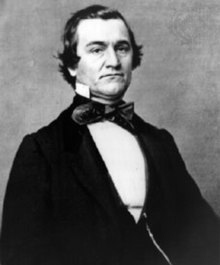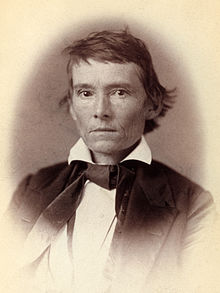
Did someone mention The Coming Fury – first book of Bruce Catton‘s Civil War Trilogy?
* * * *
My last two posts noted a recent 10-day family road-trip north, via “convoy:”
Three cars, carrying five adults and seven younger folk, ranging in age from 10 to 22. Among other places, we’ll be visiting Valley Forge, the Liberty Bell and Philadelphia in general… Last but not least we’ll see Hershey PA … “The Sweetest Place On Earth.”
 For five nights of that 10-day trip, we all stayed with my aunt in Wilmington. Her three-story house is pretty much a museum, and a much-loved place to visit. (By nephews, great-nieces and -nephews, and other relatives through marriage.)
For five nights of that 10-day trip, we all stayed with my aunt in Wilmington. Her three-story house is pretty much a museum, and a much-loved place to visit. (By nephews, great-nieces and -nephews, and other relatives through marriage.)
Nowhere is that “museum-ness” more evident than on the third floor. The third floor was pretty much my aunt’s private “penthouse” when she was young. (My grandparents stayed on the second floor.) She was an avid reader then, and a great collector of books. Which means that now the third floor of her home resembles nothing so much as a library.
And so, late one night that last week of June, in Wilmington, I sat relaxing on the third-floor bed – topped by an air mattress – sipping a bottle of Rolling Rock. It was then that my eyes lighted on a Bruce Catton book I hadn’t read. I have read – and pretty much loved – all his other CW books. But that night, I saw “Bruce Catton,” on a thick, hard-cover book, and the unread title, The Coming Fury.
 I was hooked from the first page.
I was hooked from the first page.
Catton began by describing the first of two 1860 Democratic National Conventions, with the arrival of William L. Yancey. (At left.)
It seems that certain “fire-eaters” – like Yancey – didn’t care if they caused a “split convention.” The result? A host of Democrat-delegates walked out of the convention. (In essence, a revolt that split the party.) That virtually guaranteed the opposition candidate – Abe Lincoln – would be elected.
All of which may sound familiar to modern ears. That is, what caught my eye – in reading the beginning of The Coming Fury – was the way Catton’s writing seemed to foreshadow some of the surprises that may well be coming at this summer’s Republican convention:
The delegates might look for a safe middle ground [and] work out some sort of compromise that would avert a split in the party and nation; or they might listen to extremists, scorn the middle ground, and commit all of America to a dramatic leap into the dark.
In 1860, it was the Democrats who saw their party literally split in two. (Thus virtually guaranteeing the election of a candidate they didn’t want.) In 2016, it may be the Republicans who experience a delegate revolt, and thus a split party. (See also karma.)
 The first 36 pages of Coming Fury led up to Part Four of Chapter One, “The Party is Split Forever.” (A quote from Alexander Stephens – at right – after a friend said “things might be patched up” at the second, “rump” Democratic convention in Baltimore.) Then at pages 78-80, Catton explored some of the reasons behind the split in the party.
The first 36 pages of Coming Fury led up to Part Four of Chapter One, “The Party is Split Forever.” (A quote from Alexander Stephens – at right – after a friend said “things might be patched up” at the second, “rump” Democratic convention in Baltimore.) Then at pages 78-80, Catton explored some of the reasons behind the split in the party.
He began by saying the choices made at the two competing Democratic conventions “came at least in part out of a general, unreasoned resentment against immigration and the immigrant.” (E.A.)
[By 1860,] Americans both North and South could see that something cherished and familiar was being lost. Looking back only a few years, it was easy to see a society where … everyone thought, spoke and acted more or less alike, living harmoniously by a common tradition.
Which is being interpreted: “Some things never change.” Aside from that, if anyone in 1860 had thought about it, they might have come up with a catchy slogan like “Make America Great Again.” (That is, a call to “return the country to its previous glory.”)
However (as Catton wrote), that cherished vision of the past – “singularly uncomplicated and unworried … simple and self-sustaining” – seemed to be on the verge of disappearing:
Revolutionary change was taking place everywhere … and people who liked things as they had been found the change abhorrent. Furthermore, it seemed possible that newcomers were at least partly responsible for the change… Germans, Irish, French, Italians, men of new tongues and new creeds and new folk ways, cut adrift from Europe… It was easy to feel they were corrupting the old America. (E.A.)
(79-80) Which may be another way of saying that a large group of people who hadn’t been free – before – were about to get freedom for the first time in their lives.
But then and now, such a change in the status quo scares a lot of people. As Catton wrote, “To fear change meant to fear the alien – the man who looked and talked and acted differently, and who therefore was probably dangerous.” (80) Which helped give rise to the fire-eaters noted above. (Defined in part as “extremists who did much to weaken the fragile unity of the nation.”)
 Which brings up the subject of “splitting” in another context.
Which brings up the subject of “splitting” in another context.
In Independent Voter, I noted the phenomenon of “splitting,” a personality disorder also called “black and white thinking:”
Splitting … is the failure in a person’s thinking to bring together the dichotomy of both positive and negative qualities of the self and others into a cohesive, realistic whole. It is a common defense mechanism used by many people. The individual tends to think in extremes (i.e., an individual’s actions and motivations are all good or all bad with no middle ground).
It’s also known as cognitive distortion, or or “all-or-nothing thinking.” And as noted, it’s a common defense mechanism that seems to be getting commoner and commoner these days.
 Which means that in times of great stress, people are more prone to say really hurtful, unproductive or downright stupid things. (Like ex-congressman Joe Walsh, at right.)
Which means that in times of great stress, people are more prone to say really hurtful, unproductive or downright stupid things. (Like ex-congressman Joe Walsh, at right.)
But my personal theory is that resorting to cliches, canned responses, and/or downright stupid remarks – in times of great stress – simply “beats the heck out of having to think!”
So in times of great stress – like we’ve seen in the last week or so – one option is to say something really stupid and/or counterproductive, like “This is now war!” Or you can sheathe your sword – metaphorically or otherwise – and stop adding fuel to the fire.
After all, who wants to start another American Civil War?
Or as that great philosopher Henry Ford once put it (offering a better solution):

In other words, “Be a part of the solution, not part of the problem…”
* * * *
The upper image is courtesy of NY Post’s Shameful ‘Civil War’ Cover On Dallas | Crooks and Liars. (Although there was a literal plethora of internet sources available: See for example New York Post Recklessly Hypes ‘Civil War’ After Dallas Shooting (Huffington Post), and New York Post Blares Dallas Police Killings Set Off ‘CIVIL WAR‘” – from the Talking Points Memo website – which described the Post as an “infamous tabloid, known for its inflammatory headlines.”)
The book-cover image is courtesy of The Coming Fury by Bruce Catton — Reviews, Discussion. References to the text are from the are from the 1961 hard-cover Doubleday and Company edition, “The Centennial History of the Civil War, Volume 1.”
Re: “Fire-eaters.” Here’s a quote I found working on this post, but misplaced the cite:
James M. McPherson suggested in Battle Cry of Freedom that the “Fire-eater” program of breaking up the convention and running a rival ticket was deliberately intended to bring about the election of a Republican as President, and thus trigger secession… Whatever the “intent” of the fire-eaters may have been, doubtless many of them favored secession, and the logical, probable, and actual consequence of their actions was to fragment the Democratic party and thereby virtually ensure a Republican victory.
The “success-failure” image is courtesy of Why Black or White Thinking May be Keeping Keep Your Clients Stuck: “I don’t know about you, but ‘Black or White’ or ‘All or Nothing’ thinking is one of the commonest issues I see with my coaching clients. When a client is stuck – it’s often because they are looking at the world through this Black or White thinking filter…”
(“The Coaching Tools Company.com is based on Salt Spring Island, BC, Canada. Launched in March 2009 … our goal is to inspire coaches and help spread the positive impact of coaching throughout the world. We do this by helping coaches get established, grow their clients, grow their skills and grow their businesses.”)
On that subject, see also All or Nothing’, or ‘Black and White’ Thinking and Depression.
Re: Ex-congressman Joe Walsh. See Ex Congressman tweets of war against Obama, Joe Walsh defends tweet threatening “war” on Obama, Ex-Congressman Walsh on Dallas shootings: “This is now war,” and/or Ex-congressman threatens “war,’”warns Obama to ‘watch out.”
And by the way – Joe Walsh – the Bible clearly says, “You shall not speak evil of a leader of your people.” (See Exodus 22:28 and the beginning of Acts 23.)
Re: “sheath your sword.” See also Sheath Your Sword | Duke Today.
The lower image is courtesy of Don’t find fault, find a remedy… poster | Zazzle. See also Quote by Henry Ford: “Don’t find fault, find a remedy (Goodreads). As to the phrase “You’re either part of the solution or you’re part of the problem.” it is generally – and most recently – attributed to Eldridge Cleaver. However, a guardian.co.uk article on the subject included one reader who said this was a “misquotation.” Another reader wrote: “Eldridge Cleaver was hardly being original. ‘Those who are not for us are against us’ is in the Bible – and had probably been said before that.”
Note that the Bible-quote is from Matthew 12:30 “Whoever is not with me is against me…” Note further that this was part of Jesus’ sermon on A House Divided. See also the “House Divided” Speech by Abraham Lincoln, given in 1858, when he was running for the office of Senator from Illinois. (Two years before the original American Civil War.) And finally, see the post from my companion blog, On Jesus: Liberal or Fundamentalist? That post compared Matthew 12:30 with what Jesus said in Mark 9:40: “For whoever is not against us is for us.”